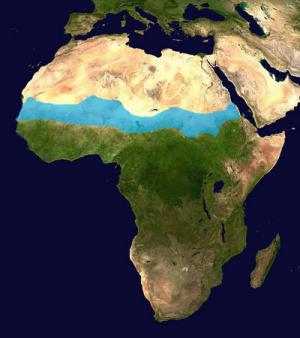African securitySahel youths susceptible to radicalization: UN envoy
Hiroute Guebre Sellassie, UN envoy to the Sahel region in Africa, said last week that up to forty-one million young people in the Sahel have nothing hut a bleak future to look to, pushing them to migrate and making them susceptible to radicalization. She said that young people under age 25 in Burkina Faso, Chad, Mali, Mauritania, and Niger “face hopelessness.” She noted that 44 percent of children in the Sahel lack access to primary education and only 36 percent of the population can read or write.

Blue area marks the area of the Sahel // Source: commons.wikimedia.org
Hiroute Guebre Sellassie, UN envoy to the Sahel region in Africa, said last week that up to forty-one million young people in the Sahel have nothing hut a bleak future to look to, pushing them to migrate and making them susceptible to radicalization.
She said that young people under age 25 in Burkina Faso, Chad, Mali, Mauritania, and Niger “face hopelessness.” She noted that 44 percent of children in the Sahel lack access to primary education and only 36 percent of the population can read or write.
ABC News quotes her telling the UN Security Council that if nothing is done to increase education, employment, and other opportunities for youths under age 25, the Sahel “will become a hub of mass migration, and of recruitment and training of terrorist groups and individuals.”
The countries in the vast, but largely empty, Sahel region south of the Sahara desert are among the poorest in the world. Sellassi noted that the region’s governments have been forced to spend a significant percentage of their meager budgets on meeting increasing security threats, leaving little to address the pressing issues affecting young people.
Sellassie said the problem is compounded by the increasing collusion among drug traffickers, armed groups, and “terrorist movements” who grant them safe passage in exchange for money.
“This unsustainable vicious cycle can only worsen without a strong international assistance,” she said.
Sellassie pointed to recent terrorist attacks in Mali, northern Cameroon, and Nigeria as evidence of the global reach of extremist groups operating in rich and poor countries alike.
“If conflicts are to be prevented in the Sahel, illicit trafficking, including of drugs, weapons and humans should be stopped,” she said.
She said that while countries in the Sahel have the main responsibility for addressing the challenges they face, the region “is a victim of the effects of global phenomena such as climate change, drug trafficking, violent extremism and the global economic decline, which surpass the nations’ capacity to address them.”
